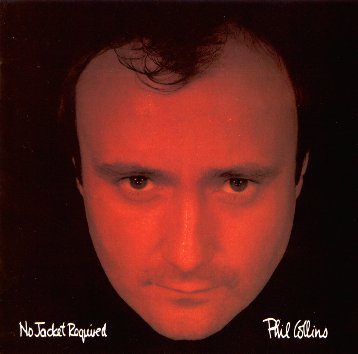
No Jacket Required (1985)

1.Sussudio
2.Only You Know And I Know
3.Long Long Way To Go
4.I Don't Wanna Know
5.One More Night
6.Don't Lose My Number
7.Who Said I Would
8.Doesn't Anybody Stay Together Anymore
9.Inside Out
10.Take Me Home
11.We Said Hello Goodbye
"Have you noticed that this guy Phil Collins is all of the sudden everywhere? I mean we got Phil Collins by himself, Phil Collins with Genesis, Phil Collins with that black guy...."
David Letterman 1985
By 1985, Phil Collins was no longer merely the drummer from Genesis or the unexpected success story of Face Value. With No Jacket Required, he officially stepped into the rarified air of global pop stardom. In the years between this and Hello, I Must Be Going!, Collins had already planted two major flags in the charts: Easy Lover, a buoyant duet with Earth, Wind & Fire’s Philip Bailey, and Against All Odds, a piano-laden power ballad from the film of the same name. Add to that Genesis’s most commercially successful album to date (Genesis, 1983), and Collins entered the No Jacket Required era with the wind at his back.
The album was, in every measurable way, a smash — Grammy Awards, chart-topping singles, multi-platinum sales. But, as with many mid-80s releases, time has not been entirely kind. Much of the material here is thoroughly steeped in the era’s sonic signature: gated reverb drums, glossy synths, and a kind of unrelenting brightness that now feels more like artifice than innovation. MTV was in full bloom, and while Collins was hardly a visual icon — stocky, balding, and looking perpetually underdressed — he somehow became its unlikely darling.
Sussudio and Don’t Lose My Number were the obvious hits, both propelled by infectious hooks and production that now screams “1985” with every electronic snap. It’s difficult to say how well these tracks would fare in another decade, but at the time they felt utterly of the moment — which may explain why they’ve aged more like neon signs than vintage suits.
Still, Collins didn’t forget how to write a classic ballad. One More Night remains one of his finest — restrained, heartfelt, and oddly timeless despite the period trappings. Likewise, Take Me Home, a sprawling closer that has since become a live staple, still lands with emotional resonance.
Lesser-known tracks like Inside Out deserve more attention than they received. Overshadowed by the album’s bigger singles, it’s a taut, mid-tempo piece that reveals more depth than its flashier neighbors. The closing track on later CD editions, We Said Hello Goodbye, wasn’t included on the original vinyl release due to time constraints, but it’s a lovely, contemplative piece that feels like the album’s hidden epilogue.
Perhaps most surprising is the emergence of Collins’ socially conscious voice — a side of him that would become more pronounced in later years. Long Long Way to Go is a sombre meditation on global indifference to suffering, underscored by guest vocals from Sting. It’s a subtle, affecting moment in an otherwise maximalist album — proof that Collins could still scale things back when the message required it.
In retrospect, No Jacket Required is both a triumph and a time capsule. It showcases a musician at the height of his commercial powers, but also serves as a case study in 1980s excess — not in terms of content, but in its commitment to sounding contemporary at any cost. And yet, Collins’ talent often breaks through the sheen.
For all its big suits and bigger drum fills, the album was a reminder that you didn’t need cheekbones or couture to sell records in the 1980s. Collins looked like an accountant and dressed like a substitute teacher — but he wrote hits. And hits, in this decade, were the only wardrobe anyone needed.
Go back to the main page
Go To Next Review